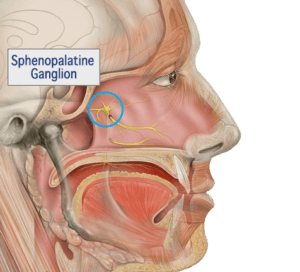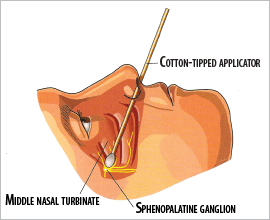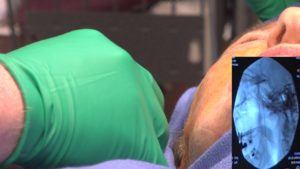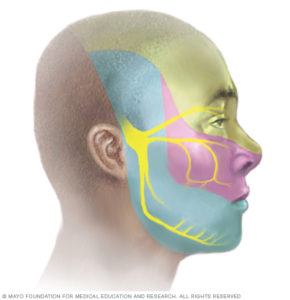Hello everyone!
I wanted to update my blog today with an article about a procedure I’ve started performing in the office which can be amazingly effective for people with migraines or other chronic headaches, pain in the head and neck, and even pain in other parts of the body (lower back pain, sciatica, etc). This blog post will focus on using the procedure for migraines and chronic headaches.
The procedure is called the Sphenopalatine Ganglion Block (SGB), and it has actually been around for over 100 years! It was pioneered by an ENT doctor named Dr. Greenfield Sluder in 1909.
The procedure consists of using numbing medication to anesthetize (i.e. block) a nerve bundle in the back of the nose called the sphenopalatine ganglion.
In the past (and currently), the SGB was done by 2 main methods:
- Blindly placing a long q-tip soaked in cocaine or lidocaine into the back of the nose and letting it sit there for 30 minutes.
- Using x-ray guidance to stick a long needle through the cheek and inject lidocaine around the sphenopalatine ganglion.
I have now developed a new method for performing the SGB. The new method is different than the old ways for these 3 reasons:
- I use a thin endoscope to see inside the nose and precisely place the numbing medication into the proper location.
- I use a concentrated lidocaine gel instead of liquid lidocaine. The gel tends to stay put rather than going with gravity to the lowest point. As a result, it can be more accurately placed.
- I don’t use any needles, just a thin plastic tube to inject the lidocaine gel.
Using the endoscope, it usually takes me about 1 minute or less to inject gel into both sides of the nose. This is not painful other than sometimes it causes some temporary stinging feeling (like when you get ocean water in your nose). After the injection, patients will lie on their backs with the neck extended slightly for 5-10 minutes to allow absorption of the lidocaine into the area of the sphenopalatine ganglion.
Why would someone with migraines want to have this procedure done?
The sphenopalatine ganglion is part of a major nerve in the head called the trigeminal nerve. This nerve comes out from the bottom of the brain and supplies sensation and other functions throughout the head and neck. It is the main nerve that transmits pain signals as well as inflammatory signals in the head.
Migraine headaches start in the brain, but the brain triggers pain and inflammation signals that travel back and forth through the trigeminal nerve. By blocking a main branch of the nerve via a SGB procedure, we are able to reset the chaotic nerve signals that cause migraine symptoms and trigger the headaches themselves.
Although the numbing effect of the lidocaine wears off after a few hours, there is usually prolonged benefit after the procedure (i.e. less frequent and less severe headaches). Repeating the SGB procedure regularly can also increase the benefit. Approximately 80-90% of patients will see some benefit (less frequent headaches, less severe headaches).
I normally recommend patients have the procedure as much as possible for 7-10 days at first (ideally this would mean getting it every day M-F). By doing this, we can get a maximal improvement in the migraine headaches. We also get a true idea of how well the SGB works for each patient (which may not be clear after only 1 procedure). My goal for every patient is to completely eliminate the headaches, though this is not always possible.
After this initial start-up period, I recommend gradually spacing out the procedures- twice a week for a month, then once a week for a month. After this, we can decide if we want to continue spacing out the treatments more. Most migraine patients do the best with weekly procedures (kind of like how allergy shots work), but this can vary widely.
The decision of how often to have the SGB procedure is more of an art than a science. Every patient is different- some want greater relief of symptoms or require more frequent injections. Others are satisfied with improvement but not complete elimination of headaches or would prefer to come in less frequently (once or twice a month).
If the SGB procedure is effective for you, it is helpful to think of it like allergy shots- something you get done regularly to prevent your problem.
My goal is to make the procedure as convenient as possible. To speed up your visit, I recommend using 1 squirt of Afrin nasal spray in both sides of the nose before coming to the office. Otherwise, we will need to use this spray after you arrive and then wait 5-10 minutes for your nose to decongest adequately.
If you suffer from migraines, there is really no downside to trying the SGB procedure! It has the potential to change your life for the better! If it is not effective, you haven’t lost anything except a little bit of time.
I cannot encourage you more strongly to call my office at 512-550-0321 to schedule an appointment to see me and have this procedure performed.
I’d like to end the blog post with a few frequently asked questions.
What are the benefits and risks of the procedure?
The potential benefit is relief from pain and headaches. This may be complete elimination of headaches, or a reduction in intensity and frequency of headaches.
There are no serious risks to the procedure. During the procedure, there can be some mild discomfort and some patients report a stinging sensation as the lidocaine gel is squirted into the nose. Some of the lidocaine may drip into the throat and cause temporary numbness there. There are rare reports of temporarily increased headache or dizziness after the procedure, though I have not personally seen these issues.
Does insurance cover the endoscopic SGB procedure?
Yes, most insurances do cover the procedure for treatment of headaches. Your out of pocket cost depends on your specific insurance plan.
Can patients continue other migraine treatments at the same time?
Yes, and we encourage all our patients to continue seeing their neurologists or pain specialists. The SGB procedure is only one part of your global migraine treatment plan.
Why should someone see an ENT doctor for migraine treatment?
An ENT doctor is the best type of doctor to perform an endoscopic procedure inside the nose. No other specialists are trained in nasal endoscopy.
Are there any restrictions after the procedure?
We recommend against making any changes in your typical caffeine intake for 72 hours after each procedure. There is a relative restriction against strenuous exercise for 24 hours after each procedure. Otherwise, there are no restrictions.
Can pregnant women have the SGB procedure?
Yes, the only medications we use are afrin spray (to decongest the nose) and lidocaine. Both are commonly used in pregnant women. We do not need to use any sedation or x-rays.
Can children have the SGB procedure?
For me to perform this procedure, I need the patient to hold completely still. Although the procedure is not significantly painful, it does feel weird and uncomfortable for a few seconds. Kids older than 12 will probably be ok getting the procedure. Kids under 8 will almost certainly not tolerate it. Kids between 8 and 12 may be able to have it done depending on their tolerance level.
Please visit https://texanent.com/migraines/ for more info and call 512-550-0321 to schedule an appointment if you or someone you love are interested in having the SGB procedure.





